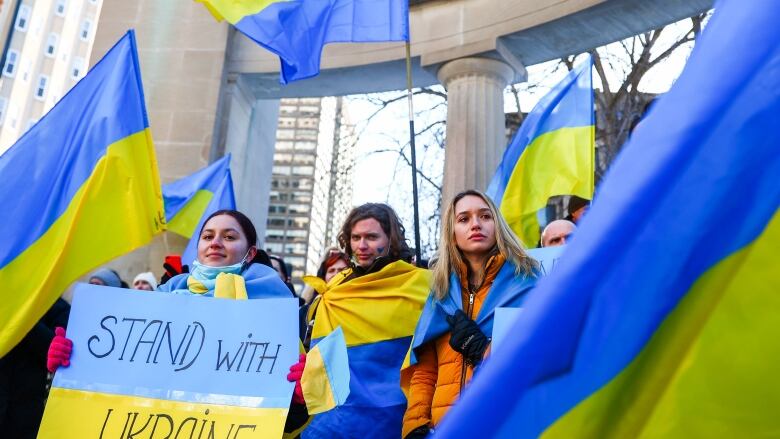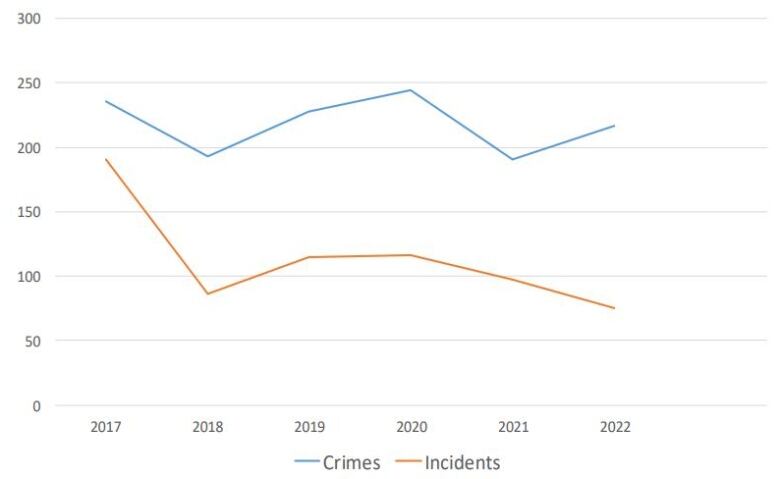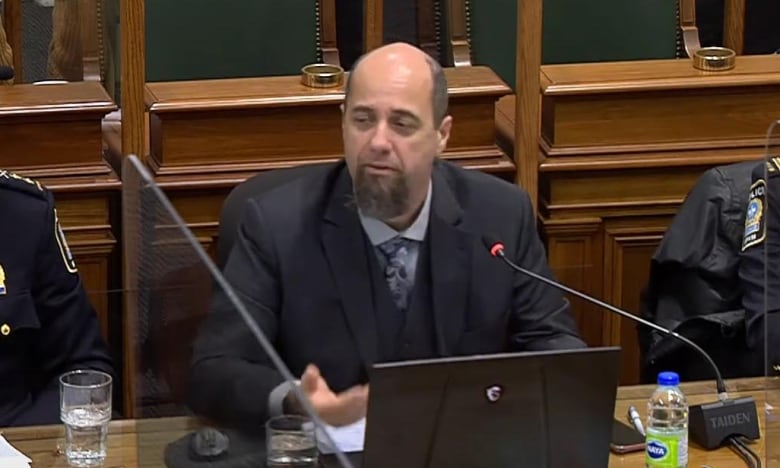War in Ukraine, transgender issues fuelled rise in hate crime reports in Montreal, police say
Hate crimes unit says it's doing more to anticipate spikes, address prevention

The war in Ukraine and recent discourse around transgender rights have fuelled an increase in hate crime complaints, according to Montreal police.
The Service de Police de la Ville de Montral (SPVM)'s hate crime unit was called to present its work at Montreal's Public Security Commission. No formal figures were put forward at the meeting, as the 2022 year is still on-going, the unit said.
Marc Bellerose, who works with the unit, theModule des incidents et crimes haineux (MICH), said world events often lead to specific spikes in hate crimes and incidents in Montreal.
Bellerose said the widespread reaction to the Russian invasion in Ukraine has led to an increase in hate-related reports from both Russian-Montrealers and Ukrainian-Montrealers.
Recent media coverage around transgender rights including transgender athletesin sports, atdrag events and in education has likewise contributed to the increase of reports bytransgender people who say they have been targeted,he said.
"When we're living through large-scale changes in our society, it's unfortunately human nature to seek someone to blame," he said. "That's exactly what we saw."
It's not the first time the MICH has noticed the trend. Bellerose said that in 2020, for example, there was a significant spike in reports from the city's Southeast Asian and Jewish communities, who were widely accused of causing or contributing to the COVID-19 pandemic.
Shortly after the Quebec City mosque shooting in 2017, there was a similar spike in reports from the city's Arab and Muslim communities.

"What that means is that even if the numbers are relatively stable year-over-year, what's happening in the world and what's in the media has a direct impact," he said.
Bellerose said the unit is putting more efforts into prevention including attempting to anticipate which world events will lead to hate crimes.
This year, for example, Bellerose said they translated brochures about how to report a hate crime into Ukrainian and Russian before the invasion even began, anticipating a spike from those groups.
Bellerose said four groups Muslim and Arab residents, the Black community, the Jewish community and the LGBT community make up the bulk of hate reports the SPVM receives at any given time.
Non-criminal incidents can still be handled
Municipal officials also questioned the MICH about how hate crimes are handled when reported.
The MICH said officers and 911 operators are being trained to always make a report when the victim identifies an incident as a hate crime, regardless of what the officer thinks of the situation. The MICH will then take over the investigation, Bellerose said.

If the event was hate-motivated or hate-related, it is either deemed a hate crime or a hate incident. A crime is when a Criminal Code infraction has been committed, while an incident may be hateful, but does not actually break the law.
Someone saying a racial slur would be an incident, while an incitement of violence or graffiti would be crimes, Bellerose said. Hate crimes are expected to rise in Montreal in 2022, while hateful incidents appear to have declined, according to SPVM projections.
In case of an incident, the police have fewer options available but Bellerose said they can still intervene.
He said there is an "explosion" of hateful comments online, for example. If the contents of the post don't break the law, they can still attempt to identify the person behind the post and ask them to come to the police station.
Sometimes it's a comment on the internet, and we say: 'do you realize what you've done? Do you realize the impact?'- Marc Bellerose, SPVM
He said the police getting involved is often enough to dissuade people from continuing to spread hateful messages. The vast majority are not repeat offenders, he said.
Having a paper trail of incidents, even if they don't lead to charges, can also assist police when a crime does occur, as it establishes a pattern of behaviour, Bellerose said.
Lack of transparency criticized
While the MICH presented its projections for 2022, the police did not put forward any official figures on how many crimes were reported, against which communities, or the conviction rate for hate crimes.
Fo Niemi, from the Center for Research-Action on Race Relations,had requested additional information at the MIHC's presentation, including figures on how many incidents were reported by which communities.
The SPVM responded that he would have to file an access to information request a highly bureaucratic process that could take months.
"We don't know exactly what the success or the outcome of [Montreal police] tackling hate crimes, hate incidents in Montreal, because we don't know and the SPVM doesn't want to tell us," he said.
CBC News also requested information on conviction rate for hate crimes reported in Montreal, and was similarly told to file an access to information request.
Niemi said police also have to do a better job of working with the affected communities, saying that lessthan10 per cent of actual hate incidents end up being reported to police.
"People are afraid, people are hesitant, people don't trust the police or criminal justice system," he said. "And some people just don't know that what happened to them can be classified as a hate crime."
He said more collaboration and more transparency could go a long way.
With files from Lauren McCallum












_(720p).jpg)


 OFFICIAL HD MUSIC VIDEO.jpg)
.jpg)



























































































